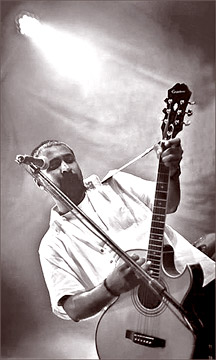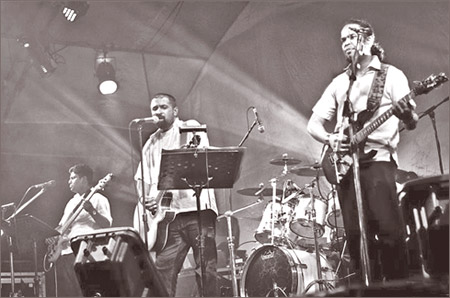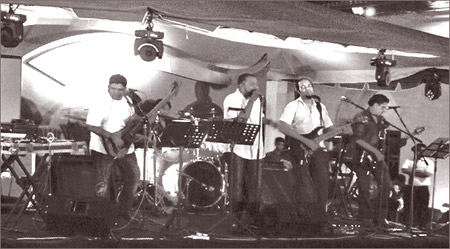Striding towards singing their own words
By Dilshan BOANGE
 Pop music and popular culture can be at times definable from the
responses it gets from the market place and how it is appreciated in
numbers. The development of technology that allows synchronisation of
tunes and melodies can now readily present avenues for aspiring
musicians to experiment with music and vocals and develop material which
is finally tested for its audience reception, out there in the present
day mediatised world of TV radio and now web based mass communication.
Although many Sinhala pop bands arrive on the scene regularly seldom do
we find local bands that sing in English, develop their own original
English medium tracks. Pop music and popular culture can be at times definable from the
responses it gets from the market place and how it is appreciated in
numbers. The development of technology that allows synchronisation of
tunes and melodies can now readily present avenues for aspiring
musicians to experiment with music and vocals and develop material which
is finally tested for its audience reception, out there in the present
day mediatised world of TV radio and now web based mass communication.
Although many Sinhala pop bands arrive on the scene regularly seldom do
we find local bands that sing in English, develop their own original
English medium tracks.
The first five
The focus of this article is about the content of a six -man
performing band named Black who have released their first CD containing
five tracks titled 'The First Five...'. As a band that would essentially
plays covers as many others that cater to the market Black has ventured
into producing a collection of their own. Yet what seems curious is how
most of the content, four of the five tracks are Sinhala medium whereas
the exterior and the language medium used for the cover suggests the
targeted audience being an English speaking one.
The songs themselves are very clearly intended for a popular market
keeping to simple, uncomplicated lyrics and ideas. The beats and tunes
are somewhat conventional and carry a familiarity of songs that speak
mostly to an urbanised audience that appreciates a touch of Anglophile
threading to the Sinhala vocals.
A faint shade of Chithral Somapala comes to mind, though his works
carry a rock music likeness whereas Ranil, Kavinda, Chamal, Ashan,
Indika and Namal have produced a collection that is more inclined
towards a local urbanised pop style.
Papare music
 The first of the five 'Pap-pap-pare' is clearly based on the
conceptual aspect of the urban 'papapre' band music that gained
popularity through Sri Lanka's big match culture. The origins of papare
band music goes to South India I was once told by a friend of mine,
Indrajith Wewalage a Fine Arts graduate from the former Visual and
Performing Arts Faculty of the Kelaniya University which is now the
University of the Visual and Performing Arts. The first of the five 'Pap-pap-pare' is clearly based on the
conceptual aspect of the urban 'papapre' band music that gained
popularity through Sri Lanka's big match culture. The origins of papare
band music goes to South India I was once told by a friend of mine,
Indrajith Wewalage a Fine Arts graduate from the former Visual and
Performing Arts Faculty of the Kelaniya University which is now the
University of the Visual and Performing Arts.
The music we know today as papare was the music of a community called
'Sakkali' who had been a much oppressed people who had developed this
music style for religious rituals in worship of their gods.
What is strikingly noticeable about the track papare by Black is that
there is no clear tones of the papare style but a more conceptual side
of appreciating what papare is to the present day Sri Lankans who will
very likely feel it is a rallying call to make merry as is the case at
occasions when paper music marks its presence.
The other four
The other tracks of the collection are -Singhavanshaye, Nimak Nethi
Adare, Sandakdo and Vishishtayek. The song Vishishtayek seems to sing
out a celebration of what one may view as self-worth. A sentiment as
that would suggest a strong sense of individualism as being the basis
for one to feel the courage to assert his beliefs. To any person his own
self confidence becomes a driving factor. And he becomes the assessor of
his own strides.
What seemed a rather curiosity generating factor from the lyrical
content of the track was if the impetus for the work 'Singhavanshaye'
was a sentiment of nationalism given the present day climates. The song
is certainly not a call to arms lest anyone was to misread the
perspective taken on the matter, but a very enthused statement based
singing out of being of the 'Singhavanshaya' or 'Lion's race'.
 What manner of sentiments does this track speak to? One may
conjecture yet that would be a line of discussion that strays towards
needless debate. It is probably a celebration of stating a lion like
maleness that comes out very markedly in Chitral Somapala's well known
song that starts off Nadee ganga tharanaye (Crossing rivers and streams)
as a Sinhala version of the song 'Many rivers to cross' made popular by
the band UB40. What manner of sentiments does this track speak to? One may
conjecture yet that would be a line of discussion that strays towards
needless debate. It is probably a celebration of stating a lion like
maleness that comes out very markedly in Chitral Somapala's well known
song that starts off Nadee ganga tharanaye (Crossing rivers and streams)
as a Sinhala version of the song 'Many rivers to cross' made popular by
the band UB40.
What could come later on?
Black as a performing band has taken a step towards developing their
own works as musicians and lyricists, which one must note is not a
development that all purveyors of performance can claim to their name.
Perhaps in the future newer strides towards entertaining an English
music oriented Sri Lanka audience could also be expected from the six
-man line up who clearly seem to believe that their talents are meant to
produce something of their own and not to be entirely for the purpose
performing works of others because the crowd simply can't get a live
show of the original artist.
|

